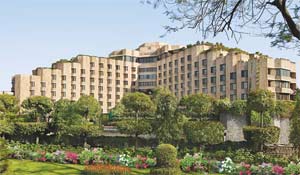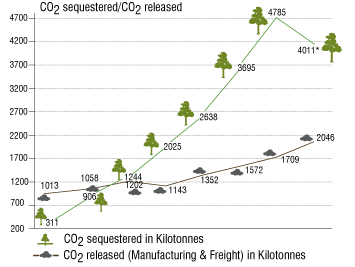The snacks Units of the Foods Business in Haridwar and Pune have considerably improved on their specific energy utilisation as illustrated below:
| Foods business units |
2009-10 |
2010-11 |
Percentage
improvement |
| |
GJ/ Tonnes |
|
| Haridwar |
6.23 |
5.19 |
16.7 |
| Pune |
10.41 |
8.83 |
15.2 |
Other Units which performed remarkably in reducing specific energy consumption over the previous year are: Cigarette Unit at Kolkata (6.8%), Packaging & Printing Unit at Tiruvottiyur ( 10.2%), Cast Coating Unit at Bollaram (13.9%) and ITC Hotel Grand Central ( 9.1%).
Additional data on energy conservation measures implemented by ITC Units are available at www.itcportal.com under Report & Accounts 2011.
ITC has 8 Clean Development Mechanism (CDM) projects registered with UNFCCC (United Nations Framework Convention on Climate Change) under the Kyoto Protocol. In addition, 2 projects have qualified for receiving carbon credits in the voluntary carbon markets. These projects besides reducing Greenhouse gas emissions have also helped ITC offset some of the investments made towards reducing specific energy consumption and enhancement of the renewable energy portfolio through the sale of carbon credits. ITC’s large scale social forestry project, the first of its kind in India, with retrospective carbon credits is in advanced stages of verification. This project will provide additional returns to the farmers in the coming years. Several other projects are in the process of being registered.
In addition, we are well positioned to take advantage of other opportunities in voluntary carbon markets and India specific schemes on the anvil, such as Perform, Achieve and Trade (PAT) promoted by the Government of India.
All ITC Premium Luxury Hotels are LEED Platinum certified
ITC has always been at the forefront of establishing iconic green buildings certified to the highest levels of energy efficiency and environmental design.
 A journey that began with the ITC Green Centre in Gurgaon (the largest LEED - Leadership in Energy and Environment Design Platinum rated office space in the world in 2004) and the ITC Gardenia in Bengaluru (the World’s largest LEED Platinum rated hotel), has now inspired the implementation of validated green/sustainability standards in existing hotels and factories. In a testimony to these efforts, the ITC Maurya in New Delhi became the first LEED Platinum rated hotel worldwide in the existing building category, followed closely by ITC Grand Central, ITC Maratha, ITC Windsor, ITC Mughal, ITC Sonar and ITC Kakatiya all of which received the LEED Platinum rating. A journey that began with the ITC Green Centre in Gurgaon (the largest LEED - Leadership in Energy and Environment Design Platinum rated office space in the world in 2004) and the ITC Gardenia in Bengaluru (the World’s largest LEED Platinum rated hotel), has now inspired the implementation of validated green/sustainability standards in existing hotels and factories. In a testimony to these efforts, the ITC Maurya in New Delhi became the first LEED Platinum rated hotel worldwide in the existing building category, followed closely by ITC Grand Central, ITC Maratha, ITC Windsor, ITC Mughal, ITC Sonar and ITC Kakatiya all of which received the LEED Platinum rating.
|
Enlarging ITC’s carbon positive footprint
 |
* Dip in CO2 sequestration rate caused by reduced productivity of Eucalyptus plantations due to infestation in some areas and lesser incremental addition of plantation area compared to 2009-10. |
ITC - A Carbon Positive Corporation - 6 Years
in a Row |
|
In 2010-11, ITC's operations (manufacturing & freight) generated total CO2 emissions of 2046 Kilo tonnes (1,709 Kilo tonnes in 09-10). Higher CO2 emissions were due to significant growth in most businesses as detailed elsewhere, increased pulp production which substitutes imported pulp as well as use of revised emission factors for the transportation sector, published by the Department of Environment, Food and Rural Affairs (DEFRA), UK, which has been adopted for CO2 estimations.
However, higher CO2 emissions were partially avoided by improved biofuel utilisation in Bhadrachalam and commissioning of new wind power projects.
ITC’s social and farm forestry initiatives added 11,652 hectares of plantations during 2010-11. Total plantations, as on March 31, 2011, now stand close to 114,000 hectares. The social & farm forestry initiatives have not only provided a sustainable source of raw material for the Paperboards Business, but have also helped sequester 4011 Kilotonnes of CO2, provided over 51.24 million person-days of employment and have also built upon ITC’s status as a ‘Carbon Positive’ Company for the sixth year in a row. |

